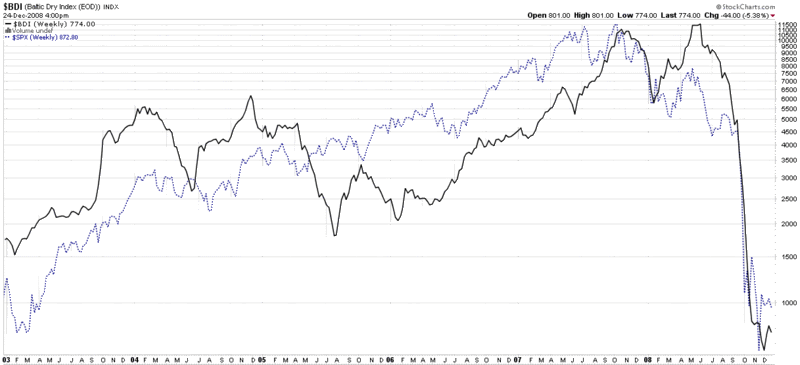I've been meaning to get to this Yves Smith post, and finally have:
"
Yet More Trade Finance Worries (Not for the Fainthearted)

Readers may know we have been concerned about the dramatic fall in shipments of basic materials, as reflected in the collapse of the Baltic Dry Index. This in turn, as we have also stressed, is in large measure to the difficulty of obtaining trade finance, in particular letters of credit.
A very good post at London Banker, "
Systemic Risk, Contagion and Trade Finance - Back to the Bad Old Days," (hat tip reader Bruce) gives a very good recap of the problem and the ramifications. Key excerpts:"
Yes, it could have been the reference to "the fainthearted" that kept me from coming back to it. I'm glad that you all saw that. Here's a chart of the Baltic, which I have a link to in my interesting sites:
Value for BDIY:IND

Now, back to the story Yves references:
"We are now starting to see the contagion effects of the current liquidity crisis feed through to the real economy...
The recent 93 percent collapse of the obscure Baltic Dry Index – an index of the cost of chartering bulk cargo vessels for goods like ore, cotton, grain or similar dry tonnage – has caused a bit of a stir among the financial cognoscenti. What is less discussed amidst the alarm is the reason for the collapse of the index – the collapse of trade credit based on the venerable letter of credit."
Read this about letters of credit:
"Letters of credit have financed trade for over 400 years. They are considered one of the more stable and secure means of finance as the cargo is secures the credit extended to import it. The letter of credit irrevocably advises an exporter and his bank that payment will be made by the importer's issuing bank if the proper documentation confirming a shipment is presented. This was seen as low risk as the issuing bank could seize and sell the cargo if its client defaulted after payment was made. Like so much else in this topsy turvy financial crisis, however, the verities of the ages have been discarded in favour of new and unpleasant realities."
Now, stop. Do you see it? I bet everyone does:
"The letter of credit irrevocably advises an exporter and his bank that payment will be made by the importer's issuing bank if the proper documentation confirming a shipment is presented."
What if, because of the banking system problems, you can't access that money? Bingo!
"The combination of the global interbank lending freeze with the collapse of the speculative, leveraged commodity price bubble have undermined both the confidence of banks in the ability of a far-flung peer bank to pay an obligation when due and confidence in the value of the dry cargo as security for the credit if liquidated on default. The result is that those with goods to export and those with goods to import, no matter how worthy and well capitalised, are left standing quayside without bank finance for trade.
Adding to the difficulties, letters of credit are so short term that they become an easy target for scaling back credit as liquidity tightens around bank operations globally. Longer term “assets” – like mortgage-back securities, CDOs and CDSs – can’t be easily renegotiated, and banks are loathe to default to one another on them because of cross-default provisions. Short term credit like trade finance can be cut with the flick of an executive wrist.
Further adding to the difficulties, many bulk cargoes are financed in dollars. Non-US banks have been progressively starved of dollar credit...."
So, problems are:
1) No lending between banks
2) Huge drop in prices of goods, so, hey, why not default the goods? That's cheaper than paying. And, yes, it's like walking away from a mortgage where the house has significantly decreased in value.
3) Short term credit, so it's easy to scale back quickly, causing an immediate crisis in the movement of goods.
4) Business conducted in dollars, which are scarce in financing now.
This is clear, but puzzling. How do you deal with 2? The other ones seem workable, especially 3, since you can also immediately solve the problem, without long and complicated negotiations. Anyway, the movement of these commodities is important. But if we can get them moving, is the drop in prices helpful to consumers, hurtful to producers, and who has worked on that?
I'm adding a comment. You can think of different payment options other than the letter of credit, but I was assuming for this post that we were trying to save it.








































